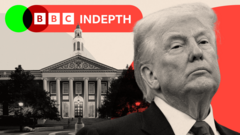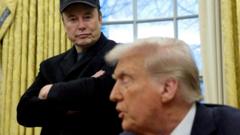As the trial unfolds, arguments surrounding competition, consumer experience, and political undertones will play a crucial role.
Landmark Antitrust Trial Puts Meta's Instagram and WhatsApp in the Crosshairs

Landmark Antitrust Trial Puts Meta's Instagram and WhatsApp in the Crosshairs
The FTC's case against Meta could force CEO Mark Zuckerberg to divest major acquisitions, reshaping the social media landscape.
A pivotal antitrust trial against Meta, the parent company of Facebook, commences in Washington, marking a critical moment for the tech giant. The Federal Trade Commission (FTC) has accused Meta of eliminating competition by acquiring Instagram in 2012 and WhatsApp in 2014, arguably establishing a monopoly in the social media sphere. Although these acquisitions were approved by the FTC at the time, the agency is now evaluating the implications with the intent of potentially forcing Mark Zuckerberg to sell off these platforms.
The crux of the FTC’s argument, articulated by Rebecca Haw Allensworth, an antitrust professor, is that Meta's acquisitions were strategically aimed at neutralizing competition posed by Instagram. Evidence from Zuckerberg's communications, in which he allegedly expressed the philosophy of 'better to buy than to compete,' may bolster the FTC's case.
Conversely, Meta plans to counter that these acquisitions have improved user experiences. The company's argument suggests that the real measure in an antitrust dispute should focus on consumer benefits resulting from the merger rather than the intentions behind it. Zuckerberg and the company's former COO, Sheryl Sandberg, are expected to provide testimonies throughout the trial, which may extend over several weeks.
Politically, the FTC v Meta case is laden with complexities, beginning during Donald Trump's initial presidency but evolving as the political landscape changes. Trump’s relationship with Zuckerberg has seen a renaissance after a period of tension, particularly following Trump's ban from Meta platforms after the Capitol riot in 2021. Recent interactions between the two, including lobbying efforts from Zuckerberg, add a layer of political intrigue to the trial.
The composition of the FTC itself is under scrutiny, especially after President Trump's decision to fire two Democratic commissioners. This action raised concerns about political motivations potentially guiding the investigations, which one commissioner characterized as intimidation tactics. Concern exists among critics about the potential for undue political influence on the commission’s integrity.
While the FTC is noted for its robust antitrust enforcement, this particular case may be an uphill battle. Experts, like Laura Phillips-Sawyer, emphasize that the presence of competitors in the social media landscape complicates the FTC's challenge in alleging that Meta's acquisitions caused anti-competitive harm. In their defense, Meta reiterates that platforms like Instagram and WhatsApp exist in a competitive ecosystem alongside TikTok, YouTube, and other services.
As the Meta trial unfolds, observers will closely watch how both the competition arguments and the broader political dynamics influence the outcomes and potential consequences for the future of social media regulation.



















